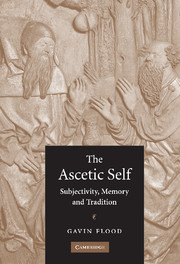Book contents
- Frontmatter
- Contents
- Preface
- Acknowledgements
- 1 Setting the parameters
- PART I THE ASCETIC SELF IN TEXT AND HISTORY
- 2 The asceticism of work: Simone Weil
- 3 The asceticism of action: the Bhagavad-gītā and Yoga-sūtras
- 4 The asceticism of action: tantra
- 5 The asceticism of the middle way
- 6 The asceticism of the desert
- 7 The asceticism of love and wisdom
- PART II THEORISING THE ASCETIC SELF
- Bibliography
- Index
7 - The asceticism of love and wisdom
Published online by Cambridge University Press: 16 November 2009
- Frontmatter
- Contents
- Preface
- Acknowledgements
- 1 Setting the parameters
- PART I THE ASCETIC SELF IN TEXT AND HISTORY
- 2 The asceticism of work: Simone Weil
- 3 The asceticism of action: the Bhagavad-gītā and Yoga-sūtras
- 4 The asceticism of action: tantra
- 5 The asceticism of the middle way
- 6 The asceticism of the desert
- 7 The asceticism of love and wisdom
- PART II THEORISING THE ASCETIC SELF
- Bibliography
- Index
Summary
Come del suo voler li angeli tuoi
fan sacrificio a te, cantando osanna,
cosi facciano li uomini de' suoi.
And as your angels make a sacrifice
of their wills unto you, singing hosanna,
so may we men make sacrifice of ours.
Dante Purgatorio 11.10–12.For Lent. No puddings on Sundays. No tea except if to keep me awake and then without sugar.
Gerard Manley HopkinsIn the vibrant and colourful world of medieval Latin Christianity, asceticism takes on a role of great importance within the spectrum of religious practice and in people's devotional lives. Before the eleventh century, fully ordained monastics may have comprised less than half of one per cent of the population, and yet the monasteries became centres of stability in the unstable and conflictual politics of Christendom and central to an ideology that simultaneously gave positive value to this world and looked to the purified world to come. While the laity undertook some forms of asceticism at times of pilgrimage, penance and during the liturgical year, it is with the monastics that it becomes intensified and a defining feature of the self. Patterns of prayer and religious reading develop the inner life of the monastic along with an outer life of adherence to rules and performance of the liturgy. The general aim, as with the Eastern tradition, is the development of the monastic's vision and moral quality whose summit is the Kingdom of God or the indwelling of the kingdom in the ascetic body.
- Type
- Chapter
- Information
- The Ascetic SelfSubjectivity, Memory and Tradition, pp. 175 - 208Publisher: Cambridge University PressPrint publication year: 2004



